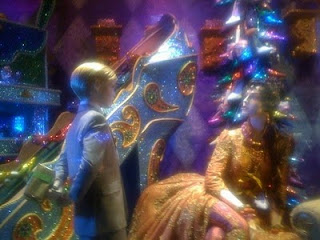 Amidst the freezing weather, it is the spirit of being with family, a warm cozy crackling fireplace, or an occasional cup of hot chocolate with marshmallows that helps the mood. Then, comes the New Year, a time to reflect back on the past year and think about what went well and what could be done better. We all have resolutions and plans and everyone hopes to follow them. However, not everyone follows their resolutions and somehow their busy lives start to take over.
Amidst the freezing weather, it is the spirit of being with family, a warm cozy crackling fireplace, or an occasional cup of hot chocolate with marshmallows that helps the mood. Then, comes the New Year, a time to reflect back on the past year and think about what went well and what could be done better. We all have resolutions and plans and everyone hopes to follow them. However, not everyone follows their resolutions and somehow their busy lives start to take over.People usually think about their lives when they are not busy. “Busyness” is a culture that is seen as glamorous and idolized in the United States.  Everyone is always “busy”. If you are not busy, somehow you must be a looser or not successful. When did we start to associate success with “busy”? Also, when did we start thinking that “busy” people are more productive? The real answer is that constantly “busy” people are not the most productive. If you have good time management skills, you will not be busy 24 hours a day. Also, many people spend too much time on unproductive things and don’t know how to prioritize their time. This leaves them in the busy cycle all the time. The concrete jungle of New York is a haven for “busy” people. They fill every minute of their day with things to
Everyone is always “busy”. If you are not busy, somehow you must be a looser or not successful. When did we start to associate success with “busy”? Also, when did we start thinking that “busy” people are more productive? The real answer is that constantly “busy” people are not the most productive. If you have good time management skills, you will not be busy 24 hours a day. Also, many people spend too much time on unproductive things and don’t know how to prioritize their time. This leaves them in the busy cycle all the time. The concrete jungle of New York is a haven for “busy” people. They fill every minute of their day with things to  do and love to over-commit themselves. They also tend to look down on people who are not as busy as them.
do and love to over-commit themselves. They also tend to look down on people who are not as busy as them.
 Everyone is always “busy”. If you are not busy, somehow you must be a looser or not successful. When did we start to associate success with “busy”? Also, when did we start thinking that “busy” people are more productive? The real answer is that constantly “busy” people are not the most productive. If you have good time management skills, you will not be busy 24 hours a day. Also, many people spend too much time on unproductive things and don’t know how to prioritize their time. This leaves them in the busy cycle all the time. The concrete jungle of New York is a haven for “busy” people. They fill every minute of their day with things to
Everyone is always “busy”. If you are not busy, somehow you must be a looser or not successful. When did we start to associate success with “busy”? Also, when did we start thinking that “busy” people are more productive? The real answer is that constantly “busy” people are not the most productive. If you have good time management skills, you will not be busy 24 hours a day. Also, many people spend too much time on unproductive things and don’t know how to prioritize their time. This leaves them in the busy cycle all the time. The concrete jungle of New York is a haven for “busy” people. They fill every minute of their day with things to  do and love to over-commit themselves. They also tend to look down on people who are not as busy as them.
do and love to over-commit themselves. They also tend to look down on people who are not as busy as them.In the workaholic world that we live in, sometimes it is good to take time to breathe. Once in a while, it is nice to take time to enjoy the aroma of a morning coffee or to pick up a tiny snowflake and see what it looks like. Once in a while, it is good to be a little child that sees wonder in little things.












